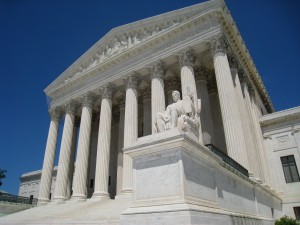Vice President Joe Biden delivered a stern message today to some university students and faculty members
about the obstruction occurring in the U.S. Senate.
It’s threatening the core of our republic, he said. Senate Republicans must not obstruct President Obama’s effort to fill a Supreme Court vacancy; they must allow nominee Merrick Garland to have a hearing, then they must debate the merits of his nomination and they must then vote on it.
True enough, Mr. Vice President.
But what about those remarks you made in 1992 about whether President George H.W. Bush should be able to nominate someone to the high court in an election year? Today’s Republicans are seeking to block Obama’s pick because this, too, is an election year and they want the next president to make the selection.
The GOP has beaten the vice president over his remarks then.
What they don’t say is that Biden also declared that he would support a “consensus candidate” in an election if one were to be presented to the Senate Judiciary Committee, which Biden chaired at the time.
Biden told the Georgetown law students and faculty members: “Dysfunction and partisanship are bad enough on Capitol Hill. But we can’t let the Senate spread that dysfunction to another branch of government, to the Supreme Court of the United States.”
It’s fascinating to me that then-Sen. Biden’s remarks now have become known as the “Biden Rule,” which has never existed.
I won’t defend Biden for making his remarks in 1992. He was wrong to suggest that a sitting president shouldn’t be allowed to perform his job if he had been given the chance to do so. President Bush did select a Supreme Court justice in 1991, when he nominated Clarence Thomas to take the seat vacated by the death of Thurgood Marshall.
However, I won’t condemn Biden for holding that view. He did, after all, add the caveat that he would support a consensus candidate for the Supreme Court.
The here and now stands on its own.
The vice president is correct to insist that today’s Senate should stop its obstruction and allow the president to fulfill his constitutional duty — and do its own duty to give an eminently qualified nominee the fair hearing he deserves.
